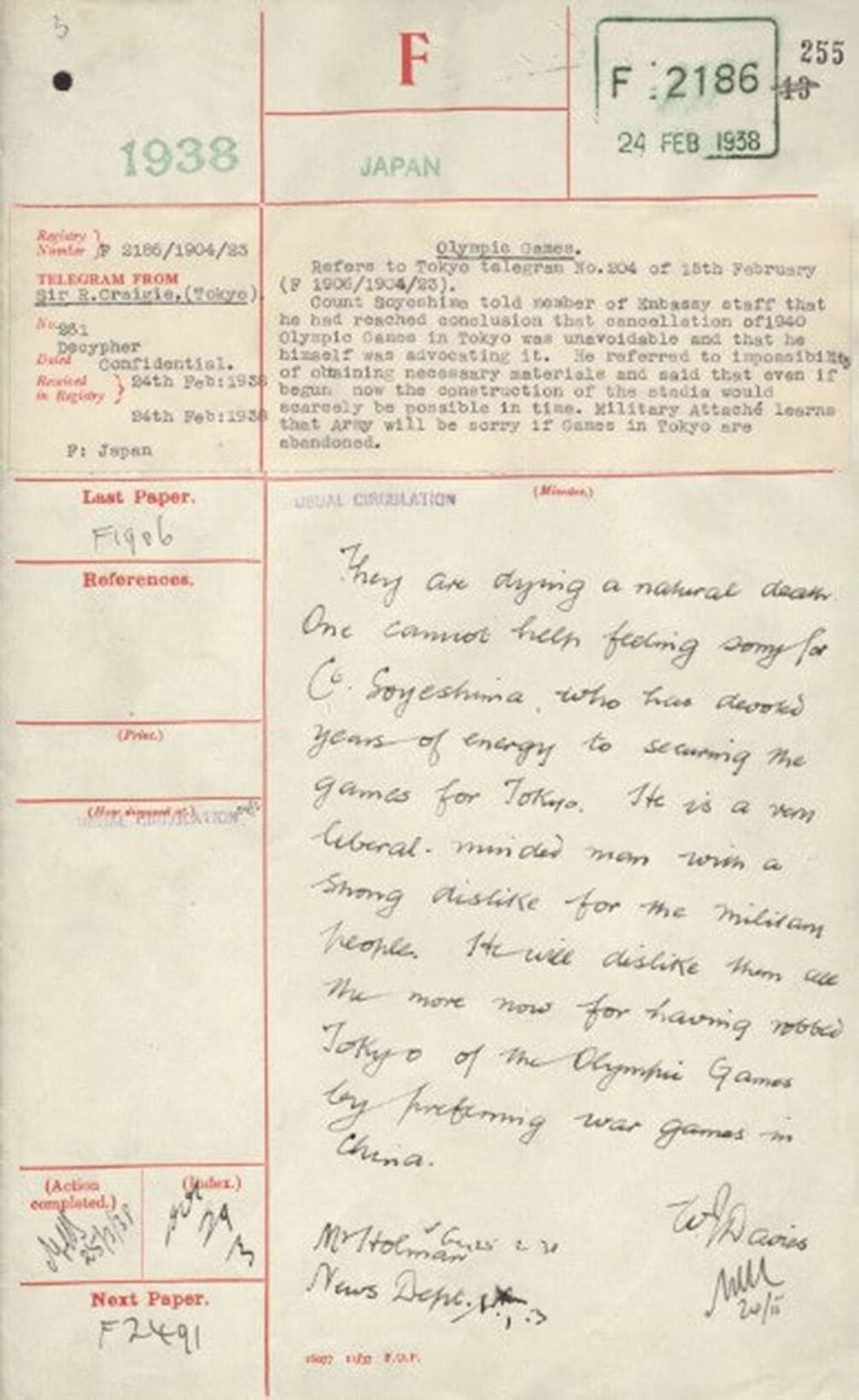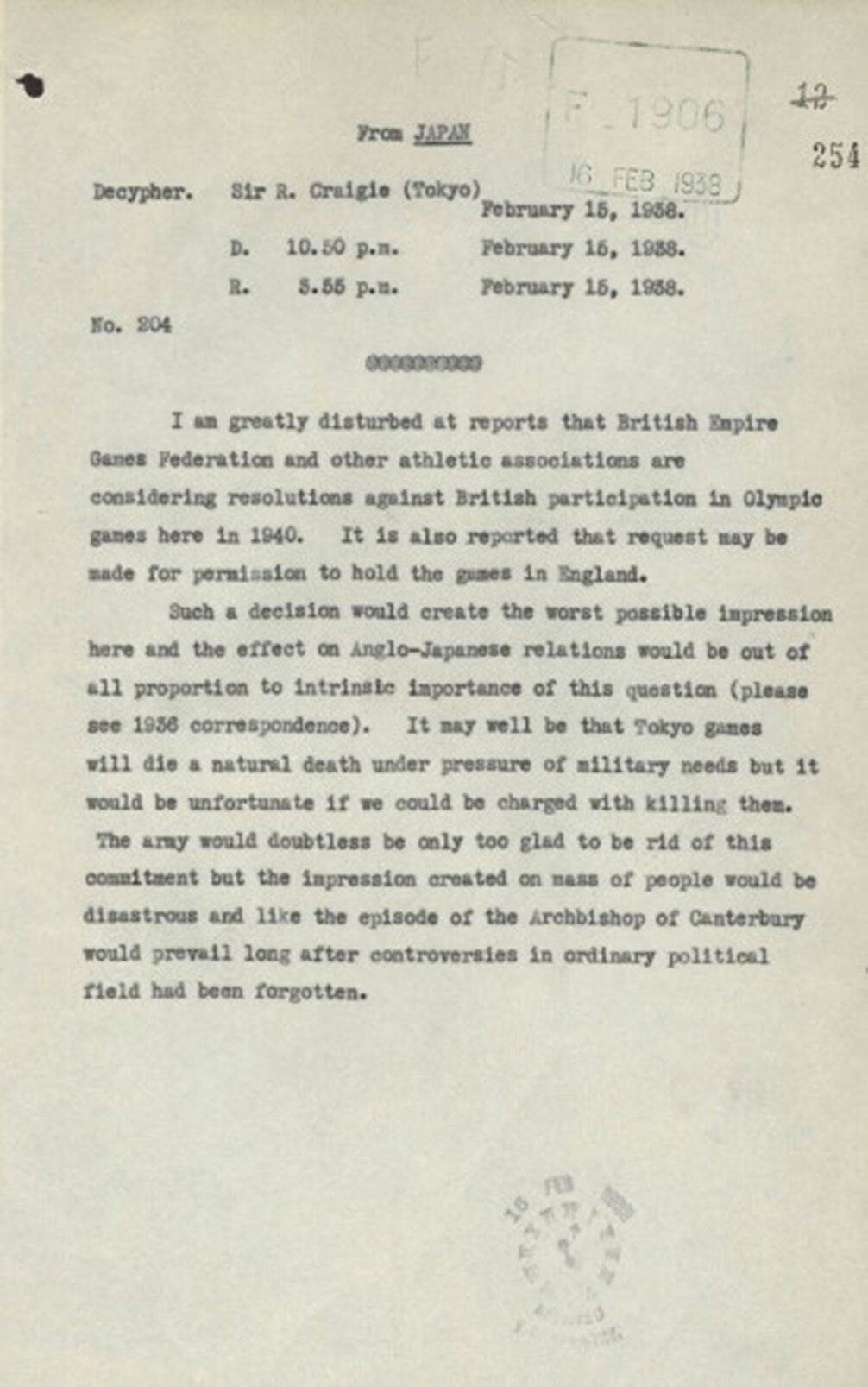The Missing Olympics
The 2020 Tokyo Olympics were postponed and held in 2021 due to the Covid-19 pandemic. However, this is not the first time Tokyo has had to cancel or postpone the international competition. Eighty years previously, the city found itself in similar circumstances, although for different reasons. Often referred to as the “missing Olympics,” material within Foreign Office Files for Japan, 1919-1952 reveals the discussions that surrounded the 1940 Summer Games and their value as a political and diplomatic tool.
Japan had hoped that hosting the Olympic Games would establish their status as an emerging modern power and argued that by staging the Games in Tokyo, the Olympic movement would become truly international. Whilst the choice of Tokyo as the host symbolised the growth of the Olympic Games, it also demonstrated their importance in international affairs. The British Foreign Office had decided to use this opportunity to encourage better relations with Japan – London withdrew its candidacy for the Games in favour of Tokyo.

However, as Japan’s war in China intensified, the prospects of hosting the Games diminished. The financial allocations were gradually reduced as the Japanese Government’s priorities shifted. A telegram within Foreign Office Files for Japan reveals that in 1938, Count Soyeshima, a member of the International Olympic Committee, reached the conclusion that cancellation of the Games was unavoidable. Soyeshima conceded that obtaining the necessary industrial materials would be impossible and they would not be able to build the stadium in time. The file comments on his dislike for the “military people,” who have “robbed Tokyo of the Olympic Games.”
Japan’s actions in China had also prompted calls for the Games to be removed from Tokyo, with London being suggested as a potential alternative. The International Olympic Committee refused to consider this, insisting that politics and sport should remain separate. Correspondence from within the Foreign Office reveals a similar stance, that this suggestion should be resisted to maintain Anglo-Japanese relations.

Sir Robert Craigie, the British ambassador to Japan, believed that any actions in response to Japanese aggression was an overreaction. He writes that he is “disturbed” by the reports that British athletic associations were considering resolutions against British participation, and that “such a decision would create the worst possible impression here.” Anglo-Japanese relations were clearly important to the Foreign Office. Even though Craigie was aware the Olympic Games were likely to be cancelled, he writes “it may well be that the Tokyo Games will die a natural death under pressure of military needs but it would be unfortunate if we could be charged with killing them.”
Although there were calls to boycott the Games, the cancellation was made by the Japanese themselves. As an alternative, the International Olympic Committee had chosen Helsinki to host the 1940 Olympics, but the Second World War led to the cancellation of both the 1940 and 1944 Olympiads.
Foreign Office Files for Japan, 1919-1952 is available now. For more information, including free trial access and price enquiries, please email us at info@amdigital.co.uk.
Recent posts

The blog highlights American Committee on Africa, module II's rich documentation of anti-apartheid activism, focusing on the National Peace Accord, global solidarity, and student-led divestment campaigns. It explores the pivotal role of universities, protests, and public education in pressuring institutions to divest from apartheid, shaping global attitudes toward social justice and reform.

This blog examines how primary sources can be used to trace the impact of young voices on society, particularly during pivotal voting reforms in the UK and the US. Explore materials that reveal insights into youth activism, intergenerational gaps, and societal perceptions, highlighting their interdisciplinary value for studying youth culture, activism, and girlhood across history.
